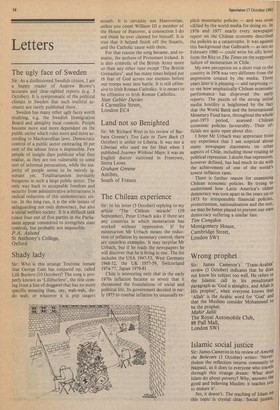The Chilean experience
Sir: In his letter (3 October) replying to my article 'The Chilean miracle' (19 September), Peter Urbach asks if there are any countries in which monetarism has worked without oppression. If by monetarism Mr Urbach means the reduction of inflation by monetary control, there are countless examples. It may surprise Mr Urbach, but if he reads the newspapers he will discover that he is living in one. The list includes the USA 1947-53, West Germany 1948-52, the UK 1957-59, Switzerland 1974-77, Japan 1979-81 . . .
Chile is interesting only that in the early 1970s inflation became so severe that it threatened the foundations of social and political life. Its government decided in early 1975 to combat inflation by unusually ex plicit monetarist policies — and was soon vilified by the world media for doing so. In 1976 and 1977 nearly every newspaper report on the Chilean economy described the policies as a catastrophe. It was against this background that Galbraith — as late as February 1980 — could write his silly letter from the Ritz to The Times on the supposed failure of monetarism in Chile.
My own perception on a short visit to the country in 1978 was very different from the impression created by the media. Three years later it is pleasing — and surprising — to see how emphatically Chilean economic performance has disproved the early reports. The puzzle of the strong initial media hostility is heightened by the fact that the World Bank and the International Monetary Fund have, throughout the whole post-1973 period, assessed Chilean economic policies favourably. Their officials are quite open about this.
I hope Mr Urbach may appreciate from my experience that I am sceptical about many newspaper statements on other aspects of Chile, including those relating to political repression. I doubt that repression, however defined, has had much to do with the achievement of one of the world's lowest inflation rates.
There is further reason for examining Chilean economic policies. By trying to understand how Latin America's oldest democracy was torn apart in the years up to 1973 by irresponsible financial policies, protectionism, nationalisation and the rest, we may be better placed to prevent our own democracy suffering a similar fate.
Tim Congdon Montgomery House, Cambridge Street, London SW I






































 Previous page
Previous page